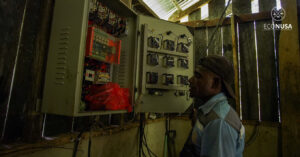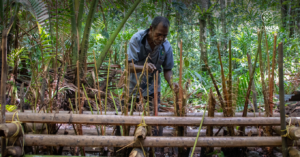
When Raja Ampat EcoNusa Covid-19 Response team arrived at Kampoong Sawinggrai office, Meos Mansar District, West Papua, last September, the mothers were very enthusiastic about participating in agricultural counseling. They asked various questions. Including the problem of land in Sawinggrai, which according to the mothers is not fertile enough to grow crops.
This question was answered by two members of the EcoNusa extension team, Jemima Desi Wamna and Utreks Hembing, by providing residents with insights about organic farming. At first, they only knew about shifting cultivation, which was left behind after planting. After listening to the explanations of the two agricultural extension agents from EcoNusa, they also learned that there are alternative ways to grow crops. Slowly they learn about the stages such as fertilization and pest elimination.
The EcoNusa team was then invited by Mama Tabita Rumbewas, one of the counseling participants, and Paulina Mambrasar, her granddaughter, to see their garden. They walked on the uphill road for a quarter of an hour. Carrying machetes and baskets of pandanus mats, they arrived at a garden measuring 100 x 80 meters. The garden is surrounded by a one meter high wooden fence.
“So as not to be entered by the wild boar,” said Mama Tabita.
The plants there are not too varied. There are only kasbi, betatas, and corn. Mama Tabita tried to plant chilies and tomatoes, but they didn’t grow well. According to Utreks, the EcoNusa agricultural extension, it needs extra care for gardens that are on the ground like in Sawinggrai, especially for vegetables.
Mama Tabita’s children began to work on the garden since February 2020. This garden actually already exists. However, because everyone was busy taking care of the homestay and making money through tourism, the garden was neglected.
“Mama is grateful to Corona, because thanks to Corona, you can gather with your children and grandchildren. So far, the land that hasn’t turned into anything can become a garden, ”Mama Tabita Rumbewas smiled. For him, a quiet homestay has its own wisdom. The lack of guest visits has actually made family gardening activities come alive again.
Mama Tabita and her grandchildren dug several spots in the garden. In a moment, their basket was full of kasbis and betatas. All of that is more than enough to serve as an afternoon snack for the children and grandchildren who gather at home.
Kristian Sauyai, another Sawinggrai resident who is also the Chairman of the PERJAMPAT Implementing Agency, said the village was one of the targets of European tourists. Its location away from the crowds makes Sawinggrai perfect for relaxing. Unmitigated, tourists can stay for months.
“There are foreigners who always stay here every Christmas, mass at the church with the villagers,” Kristian said. “The plan this year (they) want to come back again for a marriage vow at our church. Unfortunately corona made him postpone his plans. “
Kristian himself started the Mandarin Homestay business in 2017. Initially, he only had two homestays. As it progressed, the homestay grew to five. His unit which is to the east of Kampung Sawinggrai is his main source of income. With this inn, he supports his family and sends his younger siblings all the way to Java.
Homestay, which is directly facing the sea, is indeed very suitable for tourists who like silence. However, because the material is wood and palm leaves, now the building has started to crumble. The roof of the nipah leaves has many holes.
“This only lasts 1-2 years, even if it is routinely checked. If there are leaves that are slightly damaged, they must be repaired immediately, ”explained Kristian.
The pandemic has left homestays in Sawinggrai empty. For a while, they have no income from the tourism sector. In order to make a living, they have to find other ways to eat. They revived gardening activities.
Editor: Leo Wahyudi




